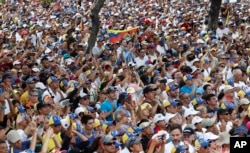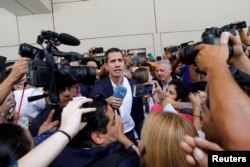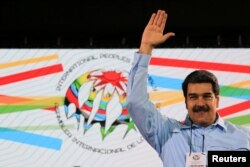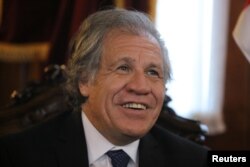Venezuelan opposition leader and U.S.-recognized interim President Juan Guaido returned safely to Caracas on Monday, despite concerns he would be arrested for violating a travel ban imposed by the government of President Nicolas Maduro.
On Feb. 23, Guaido secretly left Venezuela for Colombia, in violation of a Supreme Court order, to coordinate efforts to send humanitarian aid into Venezuela to alleviate widespread shortages of food and medicine.
He also visited Brazil, Paraguay, Argentina and Ecuador, neighbors that are among the U.S. and 50 other countries that recognize him as the interim leader of Venezuela. They also denounced Maduro's re-election last year as illegitimate after the socialist and increasingly authoritarian leader banned major opposition parties from running.
Massive rally
Maduro has called Guaido a coup-mongering U.S. puppet and said the opposition leader could face arrest upon return to Venezuela.
"He will have to face justice and justice prohibited him from leaving the country," said Maduro in an interview with ABC News.
However, the defiant opposition leader was not detained when he arrived at the airport. Instead, he was met by crowds of cheering supporters. Guaido then led a massive rally in downtown Caracas, where he said that the Maduro government's tactics of intimidation and repression will not stop the opposition from seeking democratic change.
"Their threats will not hold us back. We are here and we're more strongly united than ever. We are here and are stronger than ever," said Guaido to several thousand people gathered in the Las Mercedes neighborhood in the Venezuelan capital.
The opposition leader also called for continued public demonstrations to force Maduro's removal from office and to schedule new elections.
There was no immediate comment from Maduro's government about Guaido's return.
Stalled momentum
Guaido's return also comes amid concerns that the recent surge of economic and diplomatic pressure imposed on Venezuela has so far failed to persuade the country's military leadership to abandon Maduro, despite increased repression and poverty in a country with the world's largest oil reserves.
In January, President Donald Trump imposed sanctions seizing Venezuela's oil assets in the U.S. Venezuela had depended on U.S. oil sales for 90 percent of its hard currency income.
Guaido has also offered limited amnesty for military forces that defect.
Last week, the Trump administration imposed targeted sanctions on six high-ranking members of the Venezuelan security forces in response to the Maduro government's mostly successful efforts to block humanitarian aid convoys from entering the country.
The United States also warned Maduro there would be severe consequences if Guaido is arrested.
On Monday the White House National Security Advisor John Bolton on Twitter said, "the world is watching."
"President Guaido safely returned to Venezuela today to continue his strong push for a democratic future for the people of his country. The United States fully supports Guaido and the National Assembly. His safety must be guaranteed. The world is watching," said Bolton on Twitter.
Analyst view
The Trump administration has said the use of U.S. military force remains a possible option, but some U.S. allies in the region and in Europe oppose any military intervention in Venezuela.
"I think the model is at this point, working with other countries, multilateral diplomacy and appealing to people's concerns about the humanitarian crises going on," said Roger Noreiga, a Latin America political analyst with the American Enterprise Institute.
There are also concerns that the often fractured opposition in Venezuela will not stay unified, and that diplomatic pressure may waver, if the political standoff continues into the indefinite future.
Secretary-General of the Organization of American States Luis Almagro suggested a possible negotiated settlement that would allow Maduro to run in a new election that was open to all opposition parties. He has previously supported opposition calls for Maduro's immediate ouster.
But the U.S. and the Venezuelan opposition are against any negotiated settlement that would allow Maduro to remain in office.




